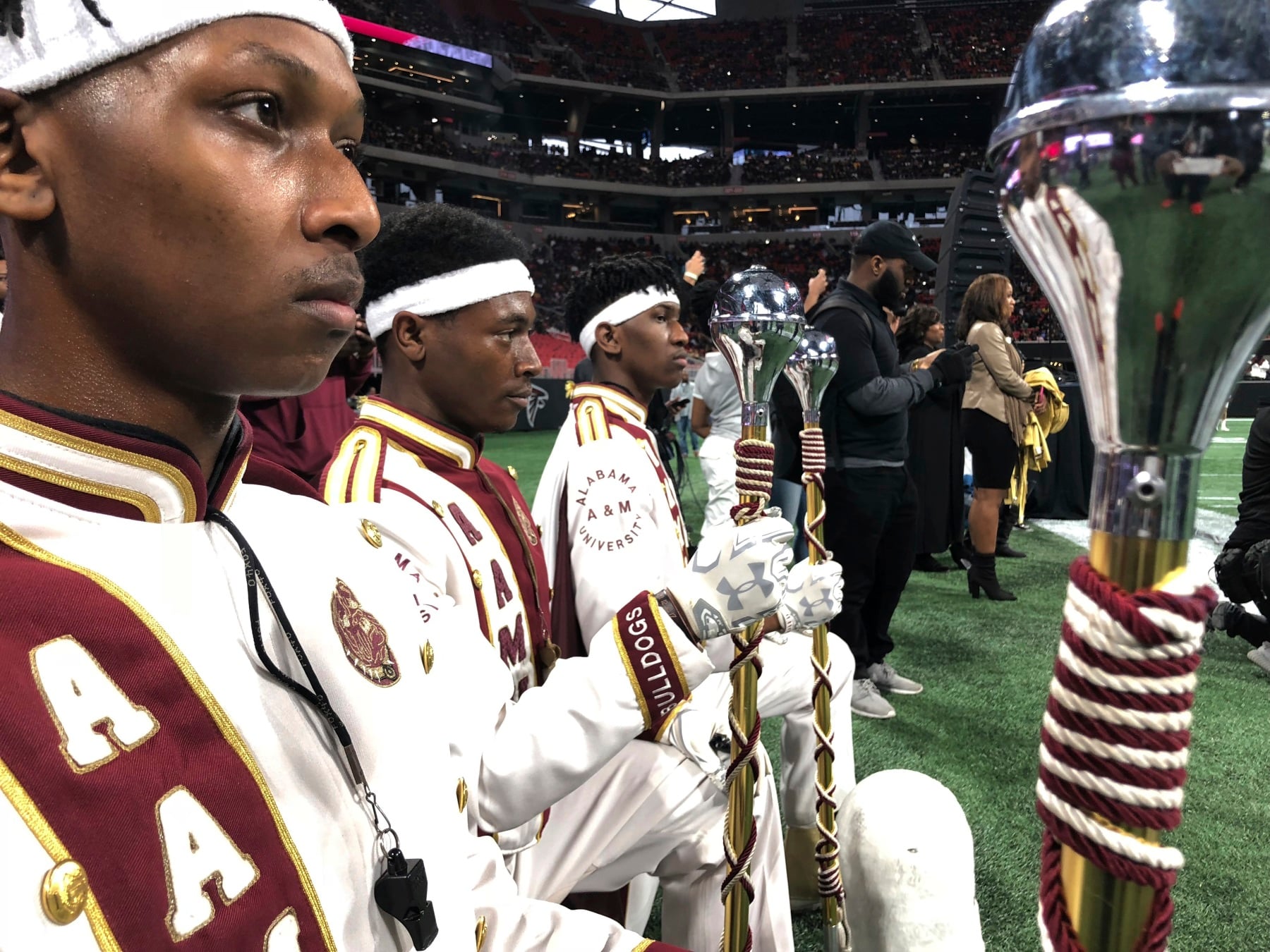For HBCU Marching Bands, It’s All ‘About The Showmanship’

Alabama A&M University Marching Band members take a knee at the 16th annual Honda Battle of Bands at Atlanta’s Mercedes-Benz Stadium in January. No matter the event, bands from historically black colleges and universities are the reason people stay near their seats during halftime football games instead of going to the concession stands. Their show-stopping performances have made an imprint on pop culture, music and film.
Jonathan Landrum Jr. / Associated Press
Five drum majors approach midfield and snap into high-stepping formation, capes swirling as they spin and drop into splits before hopping up and bending backward until their hats scrape the ground.
When they dart toward the sideline, Bethune-Cookman University’s 300-piece marching band and its 14 Karat Gold Dancers surge onto the field, performing Mary J. Blige’s 2007 hit “Just Fine” for a crowd of more than 62,000 at the 16th annual Honda Battle of the Bands Invitational Showcase in Atlanta.
High-energy routines like Bethune-Cookman’s are the norm for marching bands at many historically black colleges and universities, keeping people near their seats instead of the concession stands. But the bands are more than a halftime show; their popularity has spread through pop culture, music and film.
“It’s about the showmanship,” said James Oliver, band director of the Mighty Marching Hornets at Alabama State University. “We are a show band. Our shows must be entertaining to our fans. HBCU marching bands are so much more different than the corps-style bands. It’s entertainment on a whole other level.”
In The Spotlight With Music Stars
Known for incorporating the latest chart-topping R&B and hip-hop hits into their performances, HBCU bands have appeared alongside some of the biggest names in music.
Florida A&M’s Marching 100 performed with Prince for his spectacular Super Bowl halftime show in 2007. Southern University’s Dancing Dolls squad accompanied Madonna at Super Bowl 46 and Beyoncé at her 2013 halftime show. Southern, FAMU and Grambling State have performed at 12 Super Bowls in all.
“There’s always been a synergy between popular music and marching bands,” said Michael Keith of the Grammy-winning R&B group 112, which recently performed at the Battle of the Bands — dubbed the Super Bowl for black college marching bands.
Ludacris, Big Sean, Monica and Ne-Yo have performed at the Battle of the Bands in the past.
“I think the marriage between the pop and music world will continue to show how great the marching band culture is at black colleges,” said Keith, whose son is a drum major for Tennessee State’s Aristocrat of Bands.
Attention In Film, From Presidents
Even presidents have taken note. Miles College’s Purple Marching Machine played at a campaign rally for President Bill Clinton in 1996 and Arkansas at Pine Bluff’s Marching Musical Machine marched at President Barack Obama’s 2009 inauguration parade.
In film, Clark Atlanta’s Mighty Marching Panther Band and Morris Brown College’s Marching Wolverines appeared in the “Drumline” movies, which center on HBCU bands. Morgan State’s Magnificent Marching Machine was in the 2003 film “Head of the State,” starring Chris Rock, and Alabama State’s marching band performed in 2016’s “Billy Lynn’s Long Halftime Walk” and starred in their own reality television series, “Bama State Style,” last year.
On some black college campuses, marching band members are more popular than basketball or football players. Band sizes range from 200 to 350 at small black colleges with enrollment between 1,700 to more than 10,000 at those schools.
“Seeing HBCU marching bands on television inspired me to get into music in college,” said Bree’Shawn Watson, a member of Bethune-Cookman’s marching band. He’s the first person from his family to attend college. “I remember watching ‘Drumline,’ seeing people I could relate to, who were cool. I saw people from my hometown going to college. Being a part of a marching band gave me another outlet.”
‘It’s Our Time Now’
Despite the attention HBCU marching bands have attracted through the years, band directors believe the culture is still being overlooked and needs better exposure.
“We’ve performed at Super Bowls and parades. But the marketing for us needs to be bigger,” Miles College band director Willie Snipes Jr. said. More events like the Battle of the Bands, which brought together eight HBCUs, would raise their profile, he said.
Actor Samuel L. Jackson posted several videos of Battle of the Bands performances on Instagram, garnering nearly 400,000 views. Alabama State’s Oliver says that kind of publicity could change things.
“We’ve been so far behind and really didn’t have this platform for years,” Oliver said. “It’s our time now to show the country and world that HBCU marching bands are so entertaining. Times are changing. People are changing. We are in great demand now.”




